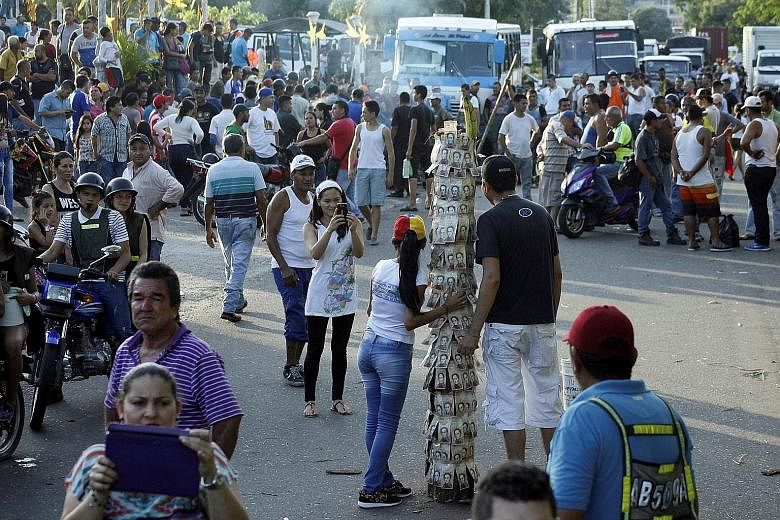CARACAS (Venezuela) • Desperate Venezuelans looted delivery trucks and clashed with the police as a botched plan to introduce new banknotes left people without cash - the latest shortage in a spiralling economic crisis.
Late last Friday, President Nicolas Maduro blamed opposition politicians for the unrest, claiming that there were pictures and videos of some opposition members of the National Assembly involved in "attempts of vandalism and some acts of violence".
He warned that "parliamentary immunity does not reach that far", but did not give any names.
Faced with the world's highest inflation that has made its money increasingly worthless, the government is trying to introduce new bills in denominations of up to 200 times higher than the old ones.
But the plan went off the rails when Mr Maduro ordered the 100-bolivar note removed from circulation before the new bills arrived.
Formerly, the highest denomination bill, the 100-bolivar note was worth about three US cents (four Singapore cents), and accounted for 77 per cent of the cash in circulation in Venezuela.
Angry protests erupted around the country as the chaotic reform left people without money to buy food or Christmas presents.
Opposition lawmaker Angel Medina from the Justice First party said large numbers of shops had been ransacked, destroyed and burned in El Callao municipality, with three people killed and many injured. In the second-largest city of Maracaibo in the west, groups of protesters hurled stones at the police, reports said. In the eastern city of Maturin, dozens of people blocked off a major avenue and looting broke out.
In response, Mr Maduro had ordered the borders with Colombia and Brazil sealed until today, exacerbating the chaos.
The 100-bolivar note ceased to be legal tender last Thursday. Initially, Venezuelans were to have 10 days after that to exchange them at the central bank. Mr Maduro subsequently slashed the grace period to five days. The new banknotes were initially to be launched last Thursday, starting with a 500-bolivar bill and eventually reaching denominations of up to 20,000. But the bills, which are being printed abroad, have yet to arrive.
In the capital Caracas, thousands of Venezuelans from around the country queued to rid themselves of 100-bolivar notes at the only place still accepting them: the central bank. Many were angry to learn they would be allowed to deposit only the old bills or obtain "special vouchers" for new ones.
Mr Maduro has presided over an unravelling of Venezuela's oil-rich economy as crude prices plunged. The import-dependent country is desperately short of food, medicine and basic household goods. Venezuela has the world's highest inflation rate, set to hit 475 per cent this year, according to an International Monetary Fund forecast.
AGENCE FRANCE-PRESSE, REUTERS

